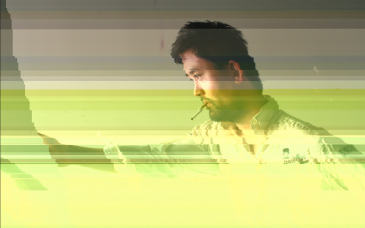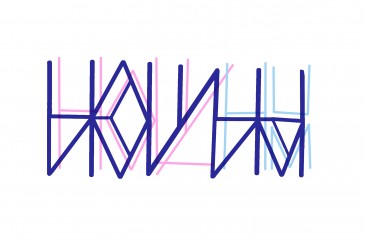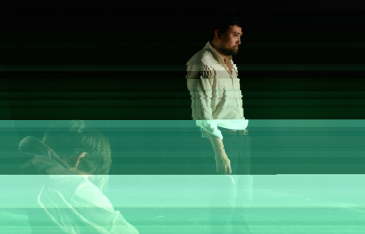
“I don’t hold that much stake in what my music is about. I just want it to be good.” Andrew Lee, tall and contemplative, sits across from me in his East Vancouver apartment, which doubles as his home studio. A mesh of wires and knobs intertwine haphazardly around his desk. As we talk, Lee’s cat Lunchbox darts in and out of the room, pausing occasionally on Casio keys to listen.
Lee is well-known in the Vancouver music scene for his decade plus as lead vocalist and guitarist for local favourite In Medias Res. Since 2013, his new project Holy Hum has been his main focus. Named for the hypnotic buzz of hospital equipment and evocative of — if somewhat smirkingly ironic towards — Lee’s religious upbringing, it’s an apt stage name.
Under this moniker, Lee has released a selection of songs that surge with the warm atmosphere of classical and ambient music, while undertones of frenetic urgency brim just beneath the surface. His most recent releases are a series of auratic ambient suites that function as a de facto trilogy; the longest, Appendix C, runs for a full hour.
“My dad was an opera singer, so I grew up listening to a lot of classical music,” Lee says. “In my mind, that’s where I got the sense of how a symphony has a certain mood, a certain tone, and there’s crescendos, peaks and valleys, stuff like that. Appendix C is sort of my attempt at that.”

Released on New Year’s Day through Lee’s Bandcamp, the composition is melancholy, hopeful, and cathartic — often all at once. “It was my first time that I actually wrote a song or a composition that had no lyrics, but for me had content in it,” he adds.
Holy Hum’s recently released EP, Appendix A + B, continues the thread of Appendix C, though it’s hardly a straightforward sequel. “I think a lot people thought it was a mistake that I put out Appendix C first, but it was always meant to be that way. I wanted to start from the end, and go forward. Appendix C was the story for me, and Appendix A+B are literally just appendices to Appendix C.” Shorter and more richly instrumented than their predecessor, the twin tracks on Appendix A + B hint at a more conventional sound for Holy Hum — one that listeners will hear expanded in Lee’s upcoming studio album, White Buzz.
“I remember when I first set out to write an album, I had bits and pieces, just small sketches, but I really liked how they sounded. I wanted to maintain that feel, so I just made the sketches really elaborate,” Lee remembers. “I just like, hit record, make some sounds, build on that. I didn’t actually sit down and write a song.” Traces of this process can be heard throughout White Buzz. Like the Appendix series, each track ebbs and flows towards a climactic end. “All my songs are just a series of crescendos,” Lee jokes.
Trading the formlessness of Holy Hum’s previous work for the structure and formulae of artists like TV on the Radio and Talk Talk, White Buzz is an aching meditation on intimacy, vulnerability, and loss. “I was trying to make an album that people would listen to, but it came out in my own vocabulary, my own language,” Lee says. “I don’t think I’m that good at writing a song, and I’ve also never written an album entirely on my own. But I felt like I had things that I wanted to say.”

From the beginning, Holy Hum has had one core concept. “I think I try to write every song about the same thing… which is, I guess, death,” he laughs. “Holy Hum was kind of birthed after the passing of my father, and so it was something that was on my mind, it was something that I was constantly thinking about. For the longest time, I tried to write an album that had nothing to do with that, because I didn’t want to deal with it. And it wasn’t until I just kind of let myself do whatever was going to come out naturally that I realized, well, this album is going to be about death.”
That fear of and fascination with death, for Lee, is reason enough to get out of bed every morning, to continue making music. “It’s an anxiety that I have that maybe I won’t be understood.” Lee also struggles with his sense of himself as a Korean-Canadian. “My own identity for me is interesting because it’s so nebulous,” he says. “I’m Korean but I was born in Winnipeg. I lived in Korea for two or three years during my childhood, my parents spoke to me in Korean and I spoke to them in English. After my father died, I was like, ‘well, who am I?’”
“I’m trying to discover my heritage, my culture, my family, and trying to figure out a way to be more rooted in it and grounded it in — but I have to make it up, because it’s not something I lived, it’s not something that was ingrained in me. I’m returning back to something that was never really there; it’s somewhere else that I have to go. And I have to go pretty far.”
Celebrating his first physical release in April and anticipating a second in the fall, Lee is anxious to continue trying new things, to challenge the expectations of his listeners as well as his own. “I think that I’ll probably make a dance record at some point, I’ll probably make an acoustic album, I’ll probably make an album just using the flute, or something.”
“I don’t know how to convey that to people — tell them that, ‘you know, I’m just going to make whatever I want.’ I guess I’m just going to do it, and if people are into it, then they will be.”


